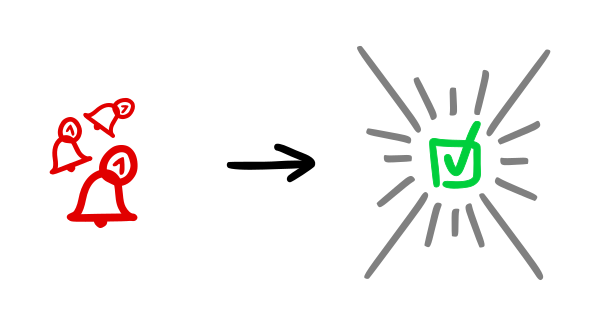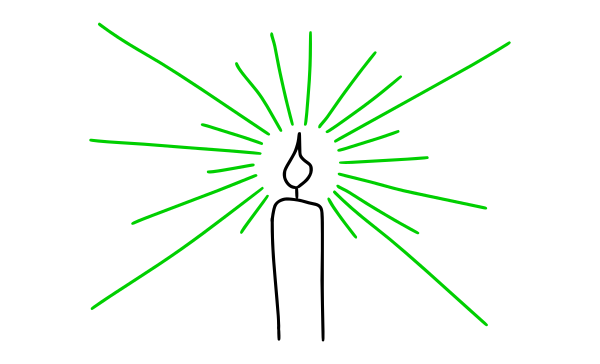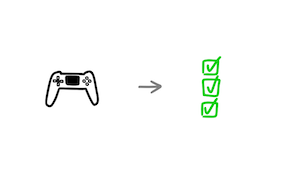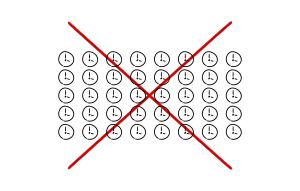How to Focus in the Age of Distraction

Why can't we focus anymore? Why is it so difficult to focus on work, reading, or studying?
We'll take a look at:
- Why we can't focus anymore
-
How to improve focus
- Strategic focus
- Task focus
Before we dive into the actionable part, here are some simple reasons why it's harder than ever to focus.
Why we can't focus
Reason #1: we process more information than ever.
According to researchers from the University of California-San Diego, we consume through our phones, laptops, TVs and all other devices about 34 GB of information per day.
The researchers say this leads to an information overload that hampers our focus and leads to constant interruptions that prevent us from reflection and deeper thinking.
Reason #2: filtering out information takes effort.
Contrary to common sense, ignoring things is not a passive mental process.
Researchers have found that it takes energy to ignore irrelevant stimuli.
In the Distracted Mind, neuroscientist Adam Gazzaley writes:
What we learned from this experiment was that the act of ignoring is not a passive process; rather, the goal to ignore something is an active one that is mediated by the top-down suppression of activity below baseline levels of passively viewing.
It's not just about focusing better, but also about ignoring better.
Reason #3: we're being trained like mice by a variable-ratio reward schedule.
Every like on social media, every notification, every email represents something new!!!
New is exciting for us. Every such message releases the neuromodulator dopamine in our heads, making us feel good and adventurous.
What if my crush sent me a message?
What if I got that job?
What if a friend wants to meet up and hang?
Unlike in the past, now we carry with us devices that enable us to check if the above is true in about 3 seconds.
How are we then supposed to do work which may require serious mental effort when we have dopamine-candy within our reach almost 24/7?
We process more information than ever, so filtering out the noise takes a lot of effort, and we're constantly being led astray from focus by dopamine-loaded interruptions. No wonder we can't focus.
How to improve focus
Given that ignoring is an active process, we'll suggest ways to both ignore noise better and focus on the signal better.
Strategic focus vs task focus
Before we go any further, we'll split focus into 2 types:
- 1. Strategic focus
Answering the question: What to focus on? - 2. Task focus
Answering the question: How do I focus on work?
1. How to improve strategic focus
Let's start with the obvious.
Define what you want to focus on
It's hard to focus on something if you don't know what it is.
If you're looking into a heavy fog, there's nothing to focus on. Same goes for mental fog.
While it's becoming popular to say "systems > goals" or even "no goals" at all, we are goal-driven by nature.
On a neural level, we filter information through our goals. Our perception of reality is to a large extent driven by goals.
As neuroscientist Adam Gazzaley writes in the Distracted Mind:
... the inward flow of information is sculpted and pruned by goals in much the same way that our actions are, resulting in our perceptions being an interpretation of reality and not a veridical representation.
In other words, when you're looking for Waldo, your mind activates neural circuits to find someone in a red-striped shirt and ignores almost all else.
Your goal determines your perception of reality. You're more likely to spot information relevant to your goal than all other information out there.
If you have a clear goal, it will be that much easier to spot the right information to help you achieve it and ignore the noise.
Which brings us to this question:
What do you want to do?
Make a list.
Once you have some sort of a list, it's not yet time to pursue all the items on it.
It's time to prioritize and refine.
Define what not to focus on - use Warren Buffett's goal setting method
Once you have any kind of a list of things you'd like to accomplish, it's not yet time to pursue goals. That would be unfocused.
Here's Warren Buffett's advice on goals:
- Write down the top 25 goals that you want to achieve in life.
- Select the 5 that matter the most.
- Forget the rest.
Buffett highlights that pursuing all 25 will distract you. It will lead to a haphazard, unfocused approach that likely won't lead to results.
The general principle of picking fewer goals than you think you want can be applied every day. It's a safeguard against the tendency to pick too many goals and diffuse your efforts.
Find 2 Wildly Important Goals
(and put them where you'll see them)
In 4 Disciplines of Execution, the authors recommend finding 2 wildly important goals (WIGs).
WIGs are goals that are so important that if you achieve them, everything else will likely work out.
They also recommend putting your goals into a specific format:
X to Y by when.
If you were to define the 2 Wildly Important Goals to focus on, what would they be?
- Get to $10 000 in revenue by July 1.
- Write 50 000 words by August 31st.
- ...
Define your goals to have a clear target to focus on.
However, that's not enough. You can write down the goals and forget them. Completely.
You need to be hyper-aware of those goals, so that they stay on your mind even through the daily turmoil of life.
How to do that?
How to focus on goals that matter despite the noise?
Create an ambient visual reminder for WIGs
Once you have clear goals, you need to make them obvious to you every day.
To do that, we recommend creating an ambient visual reminder.
A post-it note written with a thick marker on your desk.
A big poster above your door.
A timeline on a whiteboard.
Something in your physical (not digital) environment.
The trouble with a digital environment is that if you have a goal written in a to-do app of some sort, once you close it it's out of sight out of mind. If you don't open the app in the morning, you don't get reminded of the goal.
Create a highly visual reminder for your goals and place it in your surroundings so that you see it every day. Every time you glance at it, it will remind you to focus.
Strategic focus - summary
- Define what to focus on.
Make a written list. - Select only the top-most items from that list - ideally 2 items.
Decide to explicitly not focus on other, less important goals at the moment. - Phrase them in the following way: From X to Y by when.
- Place a visual reminder in your surroundings.
Put it somewhere in your physical environment where it's impossible to miss.
If you do this, you will become hyper-aware of when you're moving towards your most important goals, and when you're not. What you need to focus on will stay at the top of your mind, instead of being forgotten.
2. How to improve task focus
Once you know what to focus on, it's time to focus on it.
As we mentioned before, ignoring irrelevant stimuli is not a passive process. It takes effort.
It makes sense to divide improving concentration into 2 parts:
- Improve ignoring
- Improve concentration
Let's get into it.
How to ignore better
To minimize the effort required to ignore irrelevant stimuli, either remove them if you can, or use something to make it easier to block out the noise.
Put on noise-canceling headphones.
This is taking the ignore the noise literally. Background noises can disrupt our attention (especially true for people with ADD/ADHD). Whether it is your neighbors arguing or a PING! of a notification, if you can't hear them, you don't need to take the effort to filter them out.Find a quiet place to work.
Sometimes even noise-canceling headphones aren't enough, in that case a public library or an empty class/conference room might do wonders. Even a different room can work.Declutter.
Headphones will help with auditory clutter, but what about visual clutter?
If you have 50 post-its with ideas and to-do lists in sight, it'll take more effort to not glance at them. Remove them.
Same goes for 25 open browser tabs. Close them or go into fullscreen mode.Batch distracting activities.
If you need to respond to emails or work requests as they come, learn to ignore them, if for but a moment.
Deal with emails once every 30 minutes, or once an hour, instead of checking it randomly whenever you get a tiny bit bored or stressed.
Minimize the number of switches between tasks.Minimize distractions before a work session.
The phone is a distraction machine. Sure, we can use it productively, but when it's sitting on our desks during work, it's a constant reminder that we could be doing something fun instead.
Here are our suggestions on minimizing digital distractions:- Use the Rule of 3 Senses: hide your phone out of sight, reach, and hearing.
Put your phone where you can't see, reach it, or hear it. A drawer or a backpack both work. - Block distracting sites on your computer.
You can use our extension or some other extension that performs the same function - blocking distracting sites in your browser. When you don't have the option of opening a new YouTube tab and going down a rabbit hole, you can focus better.
- Use the Rule of 3 Senses: hide your phone out of sight, reach, and hearing.
How to concentrate better
Now that we have less to ignore, how to really hone in on work?
Go for a walk in nature (if you can).
Researchers found that at least 20 minutes of walking outside in a park or the woods significantly lowered participant's stress levels and enhanced their performance on a cognitively demanding test afterwards by about 20 %.Do concentration exercises.

You've probably heard of meditation by now. Simply focusing on your breath for 10-20 minutes a day can significantly hone your ability to focus.
One specific exercise you can try is called trataka. It may seem a bit weird in this day and age, but it works. It just works.
Here's how:- Light a candle in a dark room and place it so that it's at eye level when you sit.
- Stare at the unmoving flame for as long as you can, without blinking. (When your thoughts wander, re-focus on the flame.)
- Once your eyes start burning, close them and focus on the candle flame's afterimage in your mind.
- When the afterimage fades from your mind, open your eyes and focus on the flame again.
Repeat for 10-15 minutes, for 2-3 weeks. This exercise will train you to focus like very few other things can.
Single-task.
How do you train staying on task?
By staying on task.
Yes, it sounds stupid, but think about it like this:
If you're anything like the workers studied in research, you spent much of your time distracted. You check the phone, you check the email, you check social media.
And every time you do, you're training yourself to do more of it. You're strengthening the neural pathways for getting distracted.
So, do the opposite.
Every day, pick 1 activity and do it with your full attention. Stop switching. Focus on 1 thing. If you can't do an hour, do 30 minutes. If you can't do 30 minutes, do 15. Start training yourself to focus.Use a Pomodoro-like timer.
And yes, you've heard this one before. Nevertheless, it's helpful.
It's easier to make the effort focus when you know that you'll be done in 25 minutes and then have a break. Techniques like Pomodoro combine periods of focus and rest to help you tap into a more natural productivity rhythm.
For longer tasks, the interval could be different. According to the time tracking app DeskTime, the top performers work on average 52 minutes and then take a 17 minute break.
Task focus - summary
To ignore better:
Use noise-canceling headphones.
Find a quiet place to work.
Declutter.
Batch potentially distracting activities.
Minimize distractions before a work session.
- Put your phone out of sight, reach, and hearing (Do Not Disturb mode).
- Block distractions in the browser.
Note: you can use our extension to do this or other solutions available.
To concentrate better:
- Go for a walk in nature.
- Meditate (or do the trataka exercise).
- Train yourself to focus by practicing single-tasking every day.
- Use a Pomodoro timer.
You don't need to do all of these, just the ones that matter to you.
How to Focus in the Age of Distraction - Summary
There are 2 general components to focus:
- Ignoring irrelevant information
- Focusing on relevant information
There are 2 types of focus we highlight:
- Strategic focus (what to focus on)
- Task focus (how to focus)
That gives you 4 areas that you can improve to focus more, day by day, week by week:
- Ignoring currently irrelevant goals.
- Being hyper-aware of relevant goals.
- Ignoring irrelevant immediate stimuli.
- Focusing your attention intensely at relevant stimuli.
Use this framework to focus on signal in a world full of noise.




